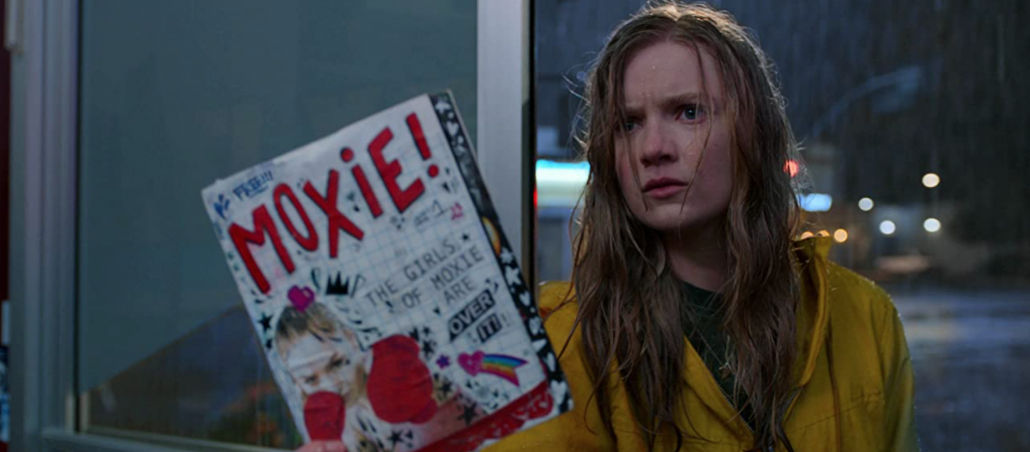REVIEW: ‘Moxie’ shouts softly into the void

For the better half of the film, “Moxie” feels like a Twitter thread — if the thread was created late at night, written by someone half-asleep and each new addition veered in a different direction. Directed by Amy Poehler, the film focuses on 16-year-old Vivian (Hadley Robinson), whose desire to find a cause she cares about for her college applications results in the discovery of her mother’s feminist and former riot grrrl past.
With the help of a new student, Lucy (Alycia Pascual-Peña), Vivian decides to start an anonymous zine titled Moxie! to change her high school’s patriarchal culture. Finally, she’s found a cause to care about.
If it sounds contrived, it mostly is. While promising as a concept, the film feels more like a rant about the patriarchy on Twitter than a strategic movement for justice.
“Moxie” could serve as an effective PowerPoint introduction to what feminism is and why it’s important. For those who have already studied and thought about the implications of patriarchal values, however, “Moxie” adds nothing particularly new to the discourse.
This isn’t to say that it’s bad. In fact, in many ways “Moxie” is a high school glimpse at an adult reality. The high school environment is rendered with surprising perspective.
When Lucy reports a classmate’s sexual harassment of her to the principal, she’s dismissed — the principal doesn’t want to cause trouble, as “harassment,” according to her, is a loaded term. The principal then tells Lucy to reconsider the language. A fellow student is sent home for not “covering up” enough. Male teachers stand up for male students. It’s a much-needed foray into the institutional structures that perpetuate systemic misogyny.
Lucy, too, is a character whose honesty and willfulness make her infinitely more interesting than Vivian, whose turn to feminism feels slightly inauthentic by comparison. Throughout the film, it’s unclear whether or not Vivian’s motivation for starting a feminist revolution comes solely from her frustration at the patriarchy or her desire to write a good college application essay.
In its depiction of high school, “Moxie” ends up blurring the lines between cringy teenage angst and real, justified discontent at sexism. At times it’s hard to tell whether the film is taking itself seriously by reducing teenage activism to repeatedly and overwhelmingly shouting angry statements about the patriarchy.
In that regard, Vivian’s best friend Claudia (Lauren Tsai) provides a nuanced counter narrative to Vivian’s own involvement in feminism. Claudia is constantly skeptical about what she perceives as the loudness of Vivian’s “revolution,” and to be honest, she’s not at all wrong.
When Claudia’s Chinese mother refuses to let her come to school wearing a tank top — a key part of Vivian’s feminist plans — Vivian finds Claudia unsupportive and critical, even though the situation is out of her hands. It’s another example of how even when these cultural differences are spotlighted, they’re still brushed aside for Vivian’s own self-righteousness.
Overt lines about including women of color are necessary, but ultimately feel performative, as if the film wants to capitalize on the need for intersectionality in the movement without directly addressing it. At the end of the day, the film still caves in to a white feminist understanding of what it means to dismantle the patriarchy.
It’s great that “Moxie” acknowledges Claudia’s point of view, but it’s also odd that the only resort for her at the end is to join the Moxie club and take the blame for Vivian’s involvement in order to protect her from the school’s punishment. Claudia ends up reconciling with her friend only by shouldering the burden for her.
The most realistic moment in the film is when Vivian visits Claudia’s house after Claudia’s suspension. Vivian doesn’t understand why Claudia decided to indict herself for the Moxie club when it wasn’t even Claudia who started it. Claudia tells her that Vivian shunned her unwillingness to take part in the “rebellion” without understanding her perspective.
It’s a perspective especially relevant to how intersectional feminism can take shape, as Claudia is the daughter of a Chinese immigrant mother who made sacrifices for her education and didn’t want her to risk the consequences of joining the “rebellion.”
“You don’t get what’s going on with me because you’re white,” Claudia tells Vivian. It’s probably the most personal and yet sad reality for a girl of color who ends up being one of the most compelling characters in the film.
“Moxie” is a coming-of-age story that while passionate, bites off more than it can chew. It gets better toward the end, encouraging audiences to come to the revolution it’s started. It’s disheartening, then, that the invitations come a little too late.

